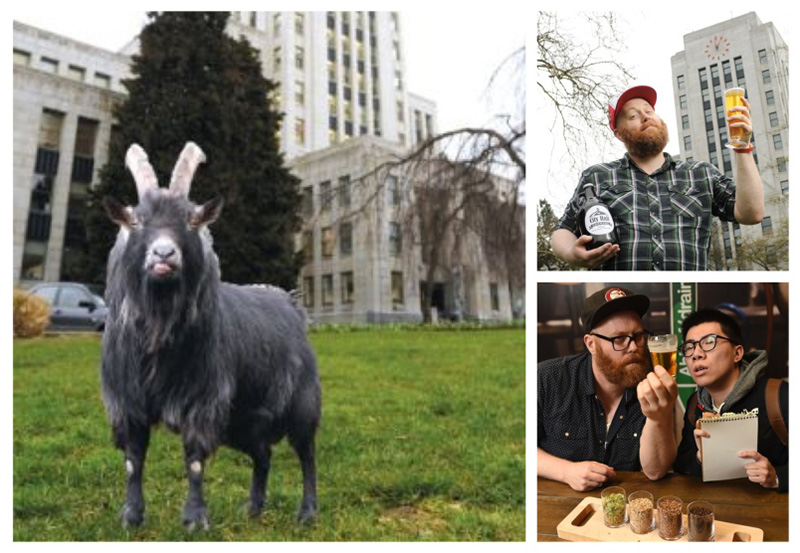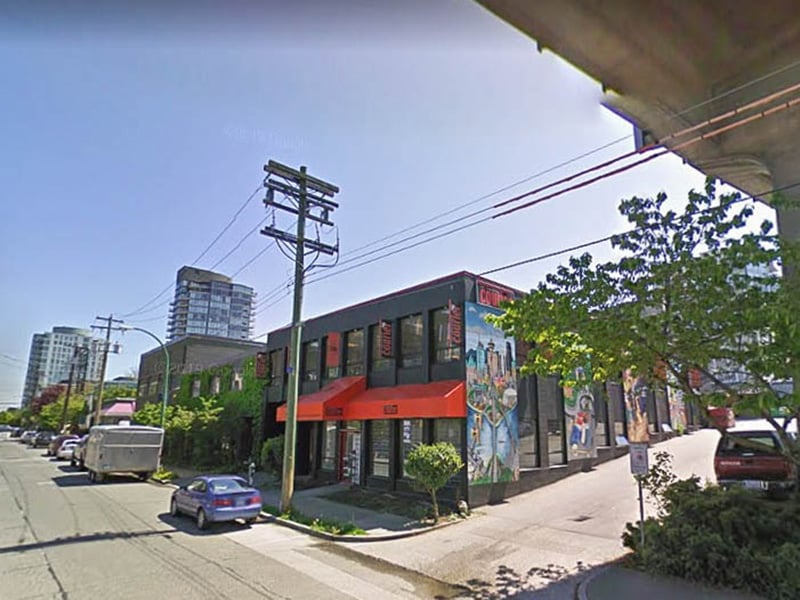On Wednesday, Glacier Media halted publication of the Vancouver Courier and laid off most staff. Glacier, which owns about 50 news outlets in B.C., also laid off staff at other papers — the Burnaby Now, New West Record, the North Shore News and the Tri-City News — saying the cuts were temporary. Black Press, which owns about 80 publications across the province, has also announced layoffs and reduced publishing schedules.
On the last day of my squandered undergraduate years, I walked into the offices of the Vancouver Courier for the first time.
It was April 2014, and I was due to start a masters program in journalism in September even though I rarely read the news. Someone asked me how I felt about joining the “fourth estate,” and I had no idea what they were talking about. I only knew that I loved my city.
I decided it was a good idea to get some experience, so I cold emailed every paper in town. The only one that invited me in? The Courier.
The Sixth Avenue offices were in a two-storey building in the armpit of one of the Granville Bridge’s ramps. One side of the building was covered with a colourful mural of False Creek and the downtown, done like a kids’ picture book. Most of the space belonged to sales, with editorial on the back half of the ground floor. The building was nestled into a hill, and venturing into the half-underground newsroom was like walking into a bunker.
I was welcomed into the office of Barry Link, the very tall editor in chief, and we had a brief chat.
Then he asked, “So when do you want to start?”
And that was how I got into journalism.
I felt like I was in some TV show where the young protagonist gets a big break. But the signs of industry doom were already there. The desk I settled into had belonged to an assistant editor, who had been laid off after 21 years.
On day one, I met the cast. The first to come in by bike and turn on the lights was Mike Howell, always early or on time, always in a nice polo, always with a hearty lunch with vegetables like gourds and beets (he called one particularly colourful meal a “Jackson Pollock”). Howell, who covered civic affairs, was the first reporter I ever met, and everyone I went on to meet in the industry had a good thing to say about him. He always had writing tricks to share with me, whether it be reconstructing scenes or playing with time, and he was always reading some interesting book about people you might not think about, like the residents of flood tunnels beneath Las Vegas.
In rolled the rest of the reporters, each with their own beats. Education, sports, planning and architecture, arts and culture, lifestyle and travel were all covered. A small band of columnists covered the gaps, filling you in on whether your English bluebells might be Spanish or what the professional atheists were up to. The photographer, Dan Toulgoet, was always quick to climb ladders or drop to the ground as needed. And in 2014, before electronics retailers like Future Shop went down, Link even had time to review the latest gadgets.
At a glance the Courier might look like a mini version of the Vancouver Sun or the Province, but I always felt the community paper, with its cozy bunker newsroom complete with carpet and couches and posters, was more like some smart and spunky school paper. There was the “serious” journalism you’d expect of a metropolitan daily, the rigorous business of covering all of Vancouver’s institutions, even if sitting in city council was like “deep vein thrombosis,” as Howell would say. There was the community journalism introducing you to the people behind your diner counter or the stars of high-school basketball.
But there were also the shenanigans.
The paper once ran a challenge from George Chow, the city councillor turned MLA, that called on readers to locate a rare Barrhead urinal in the city, what he called an “engineering marvel.”
And the paper’s anonymous Kudos and Kvetches column would skewer the silliness of the week’s headlines, like the fight for booze on BC Ferries — “Visions of pounding a Baja Rosa on the rocks with your clam chowder or sitting in a sweet, coin-operated massage chair with a mild Palm Bay buzz remain a foggy dream.”
This voice wasn’t one you’d find anywhere else. What other Vancouver publication would dare run stuff like:
“A probation officer who would drink 16 cups of coffee a day — including one before he went to bed so he could sleep — he had an odd habit of frying venison with his shirt off, which would inevitably lead to hot grease spattering his unusually large nipples, causing him to swear profusely, and in turn, get mad at us for some benign household chore we forgot to do that day.”

The Courier always offered more than a regurgitation of the undecipherable bureaucrat-speak at press conferences and board meetings. Howell’s hint to me: think of writing to your mom.
The Courier would introduce you to people behind stats. There was Rick Hof, who grew up in Steveston and died as the beloved homeless man behind a Marpole dollar store. There was Joyce Wong, the elderly bottle collector who befriended the skateboarders of Hastings Skatepark, even showing up at their sausage-themed party where people dressed up as German beer maids.
These are the stories built on deep empathy for your neighbour that awaited when you grabbed the Courier from the bundle outside your apartment, dumped the flyers and kept the rest. I always pitied the people who took the flyer fillings but left the print journalism to disintegrate in the rain.
That summer I wrote stories about a shooting at a pho restaurant and the rezoning of Cambie Street. But it was when my editor suggested I write about the death of a Dunbar man they called the “Mayor of West 18th,” the ultimate good neighbour who always had dog treats in his pocket and was trusted with the keys to all the houses on his block, that I caught on to the Courier’s boots-on-the-ground magic.
In the movies, journalists wave press badges and say the name of their publication like a magic word to open doors or compel people to speak. But in real life there’s a lot more trust and hustle involved. Covering that story, I learned that wearing care and curiosity on your sleeve is the way to get people to open up and share their stories with you.
That summer I fell in love with journalism as a way to learn more about the people and places in my city. I missed it sorely when I started school, but Michael Kissinger, the talented writer with funky socks who had taken up the editor’s reins, invited me to return to do a column. I called it the Talk of the Block, and in Courier fashion used it to uncover a 24-7 doughnut shop’s Cambodian and Angelino connections, give elderly Chinese backyard farmers their due and hail quirky Kingsgate Mall for being a refuge as its neighbourhood gentrifies.
In 2015, when cuts came for the Courier, it hurt as I watched my journalism heroes get laid off, eventually even Link, who had helped me into the industry. The education beat and sports coverage, vital to parents proud to open up the paper and see a photo of their kid the badminton champ, were hacked off. Two weekly editions became one. Other community papers in the region suffered the same cuts; some, like the Burnaby News Leader and the Richmond Review, were shuttered entirely.
The parent company, Glacier Media, moved the Courier from its funky building to an office with smooth wooden beams and postmodern amorphous light fixtures in Mount Pleasant shared with other Glacier publications. A former employee described it as a “cubicle farm.”
The Courier continued to do its signature work even as writers were shed. Until now, when COVID-19 has come for print journalism, killing advertising as businesses and restaurants closed. In the six years since I wrote my first byline, the industry has already been struggling with declines in ad revenue, the shift to online media and poor management.
On April 1, Glacier Media shut down the Courier and laid off almost all staff. (Howell survived.) The closure was “until further notice,” according to a brief story on the Courier’s website. It directed readers to Glacier’s fairly new purchase, the lifestyle content site Vancouver Is Awesome, and Business in Vancouver. A number of staff at Glacier’s other still-operational papers — the Burnaby Now, New West Record, the North Shore News and the Tri-City News — were laid off as well. Glacier says this all is temporary.
I once interviewed Kevin Diakiw, a former reporter at the Surrey Leader, which merged with Surrey Now to form the Surrey Now-Leader.
“Nothing made me happier when I was reporting for the Leader than seeing someone across the street from the Now, who’s a really strong competitor. I can taste the blood in my mouth.”
For a city like Surrey, community papers brought stories on local history and tree bylaws — and accountability, said Diakiw.
COVID-19 has now slowed down our society, but expect a new quiet where you once read one-of-a-kind stories. The people who held community knowledge and your communities to account are being laid off. This is another form of social distancing, where the stories that bring you face-to-face with your neighbours and leaders are in shorter supply than toilet paper.
We can only hope that when COVID-19 loosens its grip, new creativity will help our local journalism get well soon. ![]()
Read more: Coronavirus, Media

















Tyee Commenting Guidelines
Comments that violate guidelines risk being deleted, and violations may result in a temporary or permanent user ban. Maintain the spirit of good conversation to stay in the discussion.
*Please note The Tyee is not a forum for spreading misinformation about COVID-19, denying its existence or minimizing its risk to public health.
Do:
Do not: